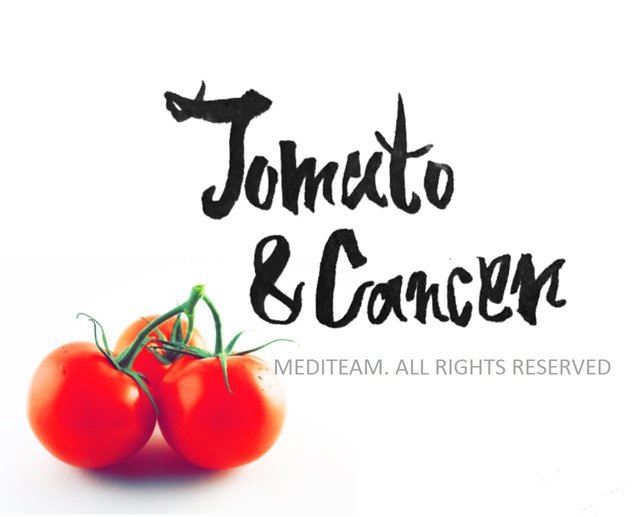Tomato and Cancer
Nowadays, many people are attempting to achieve or maintain a certain weight through different types of diet. Some of my friends are doing a tomato diet. I investigated how good the tomatoes are.
1. Components of tomato
Vegetables and fruits contain vitamins, minerals, fiber, and various phytochemicals (plant physiologically active nutrients), which are known to be very important for health. Tomato belongs to vegetable, but botanically belongs to fruit.
The important nutrients that can be obtained by tomato include carotenoids. Carotenoids are yellow, red, and purple pigments which are widely contained in plant and animal tissues, and their names are derived from carrot. Carotenoids are divided into alpha-carotene, beta-carotene, gamma-carotene, lycopene, and etc. Among these, lycopene is especially highly contained in tomatoes than other vegetables/fruits and is also found in watermelon, red pepper, grapefruit and guava.
2. Nutrient uptake is also different depending on how you eat.
You can eat vegetables either cooked or raw. In general, the total nutrient content decreases when cooked. However, bioavailability may increase so that the body can absorb more nutrients.
When you cook tomatoes, the bioavailability of lycopene and other carotenoids increases. The bioavailability of lycopene of processed tomatoes can be upto four times higher than that of fresh tomatoes. In other words, you can take more lycopene when you eat it as tomato juices, soup, sauce, and ketchup. Especially when you make them into pasta or pizza, the absorption of lycopene greatly increases in the digestive tract.
3. How do carotenoids and lycopene work against cancer?
Carotenoids are antioxidant substances. Oxidative stress causes DNA damage, and if this DNA damage is not properly repaired, the cells can become cancer cells. Therefore, many researches have been performed with the expectation that the risk of cancer could be reduced with antioxidant substances. As a result, higher blood levels of carotenoids have been found to significantly lower the risk of head and neck cancer, pancreatic cancer, and lung cancer.
Lycopene is the most potent antioxidant among carotenoids and can also inhibit cell proliferation. It also decreases LDL cholesterol, improves immune function, and reduces inflammation. In a cohort study, the higher the serum lycopene concentration, the lower the risk of prostate cancer. In addition, the risk of prostate cancer was significantly lower among people who consume a lot of lycopene.
4. What was the result from clinical studies about the intake of tomatoes and vegetables?
Studies conducted with tomato sauce have also shown that those who consume tomato sauce daily have a reduced risk of prostate cancer, especially those with more advanced prostate cancer.
Many studies have investigated the intake of vegetables as well as tomatoes, many of which have been shown to reduce the risk of head and neck cancer, esophageal cancer and stomach cancer. In a prospective study of cancer and nutrition (EPIC) conducted in ten European countries, the relationship between vegetables consumption and cancer was examined with over 500,000 people. The risk of esophageal cancer was reduced by 28% per 100g per day of vegetable consumption.
Although there are limited evidences, there have been several reports that it also reduces the risk of lung cancer, colorectal cancer, ovarian cancer and uterine cancer.
It is not easy to perform epidemiological studies on the development of cancer with certain foods. Because there are many disturbance factors, we cannot conclude that the findings above are true. Therefore, we have to comprehensively determine how much researches has been done and how homogeneous their results are. Tomatoes have been reported mostly in the direction of reducing the incidence of cancer, rather than adversely affecting cancer. Also, it have shown some consistent results, especially in terms of beneficial effect against prostate cancer.
Reference
- World Cancer Research Fund & American Institue for Cancer Research. Food, Nutrition, Physical Activity, and the Prevention of Cancer: a Global Perspective. 2007.
- Ito Y, Wakai K, Suzuki K, et al. Serum carotenoids and mortality from lung cancer: a case-control study nested in the Japan Collaborative Cohort (JACC) study. Cancer Sci 2003;94:57-63.
- Giovannucci E, Rimm EB, Liu Y, et al. A prospective study of tomato products, lycopene, and prostate cancer risk. J Natl Cancer Inst 2002;94:391-8
- Heber D, Lu QY. Overview of mechanisms of action of lycopene. Exp Biol Med (Maywood) 2002;227:920-3.


Wow, didn’t know the tomato has so much nutrition. Thanks for the post.
Great post, tomato has so many benefits. It should be organic not full of pesticides
My uncle has prostate cancer and is currently battling it right now. This is a very significant post, thank you so much for sharing!